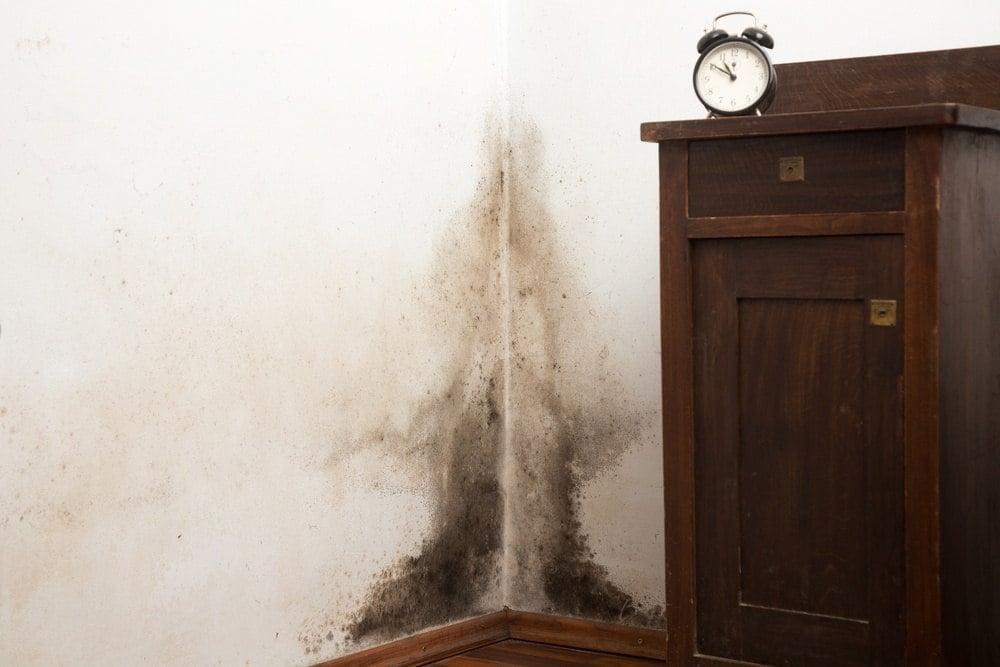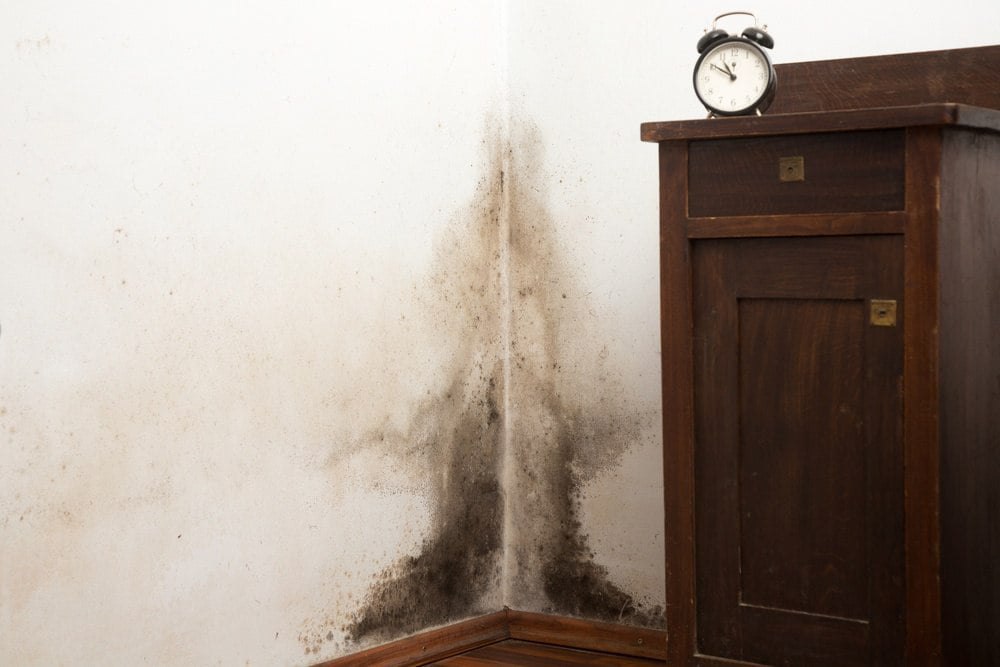Black Mold in Houston: Signs, Symptoms, and Risk Factors
September 19th, 2017 | 5 min. read
By Chuck Leider


Hurricane Harvey brought some of the most catastrophic flooding that the city of Houston has ever seen. Now that the storm is over and the water is receding, business and homeowners are beginning to piece their lives back together — and clean up the mess that has been left behind.
While countless properties have been completely destroyed, many evacuees who are returning to Houston are elated to find that their homes and businesses are still standing. However, before they breathe a sigh of relief, there is something that could quickly become a serious concern: black mold.
The combination of moisture left behind by Harvey’s flooding and Texas’ warm, humid environment, unfortunately, create the ideal conditions for mold growth — and it can begin to develop quickly. According to the Federal Emergency Management Agency (FEMA), mold can begin growing in as little as 24 to 48 hours after water damage.
After Hurricane Katrina, investigators from the Centers for Disease Control and Prevention (CDC) found nearly half of the water-damaged homes inspected contained mold. In the aftermath of Hurricane Harvey (and Hurricane Irma), flood victims need to be vigilant about detecting and treating mold.
With mold growth comes serious health concerns, the majority of which affect the respiratory system. While you’re rebuilding your life after being affected by Hurricane Harvey, it’s important that you have a firm understanding of black mold and the complications it can cause.
What is Black Mold?
Loosely defined, mold is a type of fungi. There are various types of molds, and each type is differentiated by the way that it grows. Generally, mold grows in the formation of hyphae, a thread-like, multi-cellular structure. It forms in a variety of shapes and sizes, and it also ranges in color.
Black mold is the most infamous form of all types of mold. Scientists call this type of mold Stachybotrys chartarum and Stachybotrys atras. Black mold is considered a toxic form of mold because it has been found to cause several health complications.
What Makes Black Mold Dangerous?
All varieties of mold contain spores, which are what the fungi uses to reproduce. These spores are spread through the air and are invisible to the naked eye. The reason why black mold is deemed dangerous is that it can produce toxins, or more specifically, mycotoxins, which are, as the name suggests, toxic.
When you breathe in black mold’s toxic spores, your respiratory system can be affected. As a result, you could be at risk for developing unpleasant, or even dangerous, side effects.
Signs of Black Mold in Houston
Like all types of mold, black mold thrives in moist, warm environments— exactly the type of environment produced by the flooding caused by Hurricane Harvey. If your property was impacted by the flood, you have an increased chance that your home or business is (or will be) infiltrated by this type of mold.
There are several warning signs that indicate the presence of black mold in your home or business. When it comes to detecting mold, use your eyes as well as your nose.
Some of the signs that you should be on the lookout for as you examine your Houston home or business impacted by flooding include:
-
Visible mold growth. One of the tell-tale signs of black mold growth is actually seeing it. As you’ve likely guessed, this form of mold appears black in color; however, it isn’t always dark black. It can actually appear to be grayish, greenish, or blackish. It often has a slimy-like texture, as well.
-
An odor. Black mold isn’t always visible, which is why it can be difficult to identify. It feeds off of surfaces that have a high cellulose content, or that are low in nitrogen. Black mold has pungent musty or mildew-type of odor, so if you notice this scent, seek further investigation from a mold expert.
If mold growth is present in your heating and air conditioning venting systems, the odor may only be evident when the system is turned on. Therefore, when you run your HVAC system, pay close attention if you smell a musty odor.
Drywall and wood, when wet, make a good habitat for black mold. In fact, Stachybotrys can grow on virtually any building material, including:
-
Sheetrock
-
Insulation
-
The underside of wallpaper
-
Carpeting
-
Wood material, including flooring and furniture
-
Ceiling tiles, including dropped down ceiling tiles
-
Heating and air conditioning venting systems.
Even though you may not see signs of mold growth when you ask yourself "what does black mold look like", if your home or office was affected by Hurricane Harvey’s flooding, there is a strong chance that this fungus could be growing and spreading throughout your property.
Symptoms of Black Mold
Black mold toxins have been found to cause respiratory health problems, and the side effects mimic allergies that affect the respiratory system. If black mold is growing in your space, you’re at risk for developing a number of symptoms, some of which include:
-
Itchy and watery eyes.
-
Scratchy nose and throat.
-
Stuffy, runny nose.
-
Difficulty breathing.
-
Wheezing.
-
Increased sneezing.
-
Excessive fatigue.
-
Relentless sinus headaches.
-
Excessive coughing, which could present with blood.
In more severe cases, black mold can affect other parts of the body, which may be evident by the following symptoms:
-
Gastrointestinal side effects, including nausea, vomiting or diarrhea.
-
Kidney or bladder complications, which may be marked by pain in the lower abdomen and lower back.
-
A weakened immune system.
Risk Factors for Black Mold in Houston
While anyone who is exposed to black mold can develop side effects, some people, particularly those who have a mold allergy or who are more susceptible to being affected by the toxic spores, are at risk of developing a life-threatening condition. This is particularly true if the individual is exposed to the mold spores for a prolonged period of time, or if he or she is more susceptible to the toxic spores.
Those who have an increased risk of developing health complications as a result of black mold exposure include:
-
Newborns, infants, and young children.
-
The elderly.
-
Those who are already affected by a respiratory condition, such as asthma, COPD, or chronic sinus infections.
-
Anyone who has a compromised immune system, as a result of HIV or cancer, for example.
Whether you’re more inclined to or not to be affected by mold, the symptoms of complications tend to be minor, at first. You might experience a slight cough or congestion, for example. Over time, however, you’ll notice a marked decline. Your cough may become worse and present with blood, sinus headaches may become severe and debilitating, or you may start to experience severe lower back or abdominal pain.
If you reside or own a business in Houston and you’re returning to the area after the devastating flooding caused by Hurricane Harvey, it is imperative that you are aware that there is a chance you will be exposed to black mold. If your home or business was affected by the flooding, and if moisture is still present, your chances of being affected by black mold are high.
What to Do If You Have Black Mold in Your Home or Business
If any of the signs of black mold are present in your home or place of business, if you experience any of the symptoms of black mold exposure, or if you believe your black mold risk factors are high, it’s imperative that you are proactive. Not only should you act quickly to have your property properly inspected for this toxic fungus (and removed,) but you should also seek the necessary treatment to have your symptoms diagnosed and treated.
Here at Houston ENT & Allergy, we are well experienced in detecting black mold symptoms and complications and treating them. If you’ve developed any of the above symptoms of black mold, we’ll perform a thorough evaluation and provide you with the necessary treatment to ease your symptoms.
After experiencing the flooding, damage and destruction caused by Hurricane Harvey, we know the last thing you need to worry about is your health. If you have been affected by black mold, you can count on Houston ENT & Allergy to address your health issues, so that you can focus on rebuilding your life — brick by brick.
Topics:
